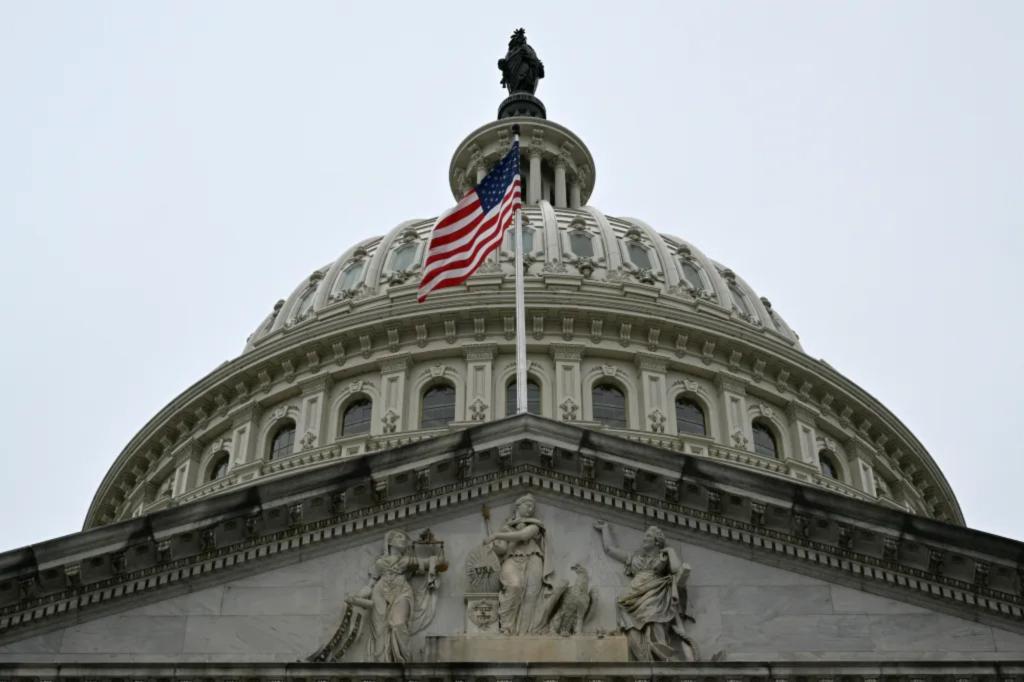politics
The Senate struck a deal Friday night to bring the $1.2 trillion federal spending bill to a vote, but it missed the midnight deadline and triggered a partial government shutdown.
The spending bill is expected to easily pass the Senate, but senators stalled for hours on Friday on whether to vote on amendments to the huge bill that passed the House.
With just minutes left before the deadline, Senate Majority Leader Chuck Schumer (D-N.Y.) agreed to a series of votes on the amendments, which would lead to a final vote on the bill early Saturday morning. It was announced that he would be removed.

“It's good for the American people that tonight we reached bipartisan agreement on funding the government,” Schumer said on the Senate floor.
If senators can pass the bill by Monday, when the work week begins, the impact on government operations would be limited.
The so-called “minibus” bill that President Biden signed into law earlier this month has resulted in federal government agencies being closed on weekends and many being fully funded.
Any amendments to the bill would send it back to the House for approval, which adjourned Friday afternoon for a two-week recess.
Some Republican lawmakers press ahead with votes on amendments related to border security, immigration, Iran sanctions, and the Laken-Reilly Act, despite the fact that if passed would almost guarantee a long government shutdown He was very enthusiastic about it.
Republican lawmakers held Democrats responsible for the government shutdown by refusing to vote on the amendment.
“Senate Democrats are once again threatening to shut down government to avoid a vote on the Border Security Amendment,” Sen. Bill Hagerty (R-Tenn.) wrote in X before the midnight deadline. “The question you should ask them is: Would it be better to shut down the government than shut down charter flights for illegal immigration to American cities?”
The Tennessee Republican also suggested that vulnerable Senate Democrats running for re-election are “afraid” that a vote on the amendment will go on the record.
“Senator Democrats are afraid to take a stand on Biden's failed policies by voting for amendments to the spending bill,” Hagerty said. “They would rather shut down the government than take a stand on President Biden’s failures.”
Sen. Sheldon Whitehouse (DR.I.) criticized Republicans.
“Well, it appears we are headed for a shutdown at the hands of the Senate Republican gremlins. I know it can't pass.''I just want an amendment.'' And (3) we cannot decide for ourselves that the amendments we want will not pass,” the Rhode Island Democrat tweeted.
“I hope I'm wrong. But the Republican Senate caucus is a rudderless ship right now, so the gremlins are running the show,” the White House added.
Sen. Jon Tester (D-Mont.), who is seeking re-election, said he would not oppose voting on the amendment despite the political risks.
“There's an opportunity here to separate me from some people,” Tester told reporters. “[Republicans are] This is the bill that killed the biggest immigration bill ever on the Senate floor. The same Republicans…killed it. If you want to do something about immigration, you better look in the mirror. ”
But Sen. Tom Cotton (R-Ark.) told reporters that Tester had privately told lawmakers he didn't want to vote for the amendment.
“That's bullshit” tester said about the accusation.
Further complicating Senate proceedings was the funeral of Sen. Susan Collins (R-Maine)'s mother, scheduled for Saturday, which some senators wanted to attend. According to NBC News.
Collins, who was elected to the Senate in 1996, has never missed a vote.
The spending bill targets funding for the departments of Defense, Homeland Security, Labor, Health and Human Services, Education, State, and the Legislature.
The House voted 286-134 to approve a 1,012-page bill that would provide funding to these departments and organizations through Sept. 30.
Republican supporters of the package pointed to $200 billion in federal spending cuts over the next 10 years, including the recapture of $6 billion in unused COVID-19 relief funds.
Defense spending will increase by $27 billion, including a 5.2% pay increase for U.S. military personnel.
The package also includes $3.3 billion in continued funding for Israel and $300 million in Pentagon funding to support Ukraine's war effort.
House Republican leadership also plans to cut funding to the United Nations Relief and Works Agency, a Palestinian refugee organization whose employees participated in the Oct. 7 terrorist attack on Israel, and to cut funding to the federal government's Diversity, Equity, and Inclusion (DEI) organization. ) celebrated cutting funding to the program.
Democrats approved rejecting “right-wing” add-ons.
“As far as I can tell, the vast majority of right-wing policy riders have been rejected and are not included in the spending deal, including in important areas,” said House Minority Leader Hakeem Jeffries (D-N.Y.). He said this at a press conference on Thursday. meeting.
On March 8, Congress passed six previous bills, a $467.5 billion minibus package, that would fund the Departments of Veterans Affairs, Agriculture, Transportation, Commerce, Justice, and Housing and Urban Development, as well as the Food and Drug Administration and military construction. ” was passed.
If passed, the second component would increase the $886 billion and $7,040 in defense funding agreed in January by House Speaker Mike Johnson (R-Louisiana) and Senate Majority Leader Chuck Schumer (D-N.Y.) A total spending agreement of $1.66 trillion, consisting of $1 billion, will be completed. Billions of dollars in non-defense discretionary funds.


